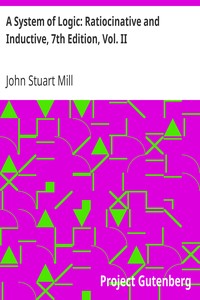A System of Logic: Ratiocinative and Inductive, 7th Edition, Vol. II by Mill
"A System of Logic: Ratiocinative and Inductive, 7th Edition, Vol. II" by John Stuart Mill is a philosophical treatise published in 1843. This foundational work in the philosophy of science establishes Mill's famous five principles of inductive reasoning, known as Mill's Methods. Mill outlines the empirical principles underlying his moral and political philosophy, arguing that the methods of physical science must be extended to the moral sciences. The work examines reasoning, inference,
fallacies, and the logic of human understanding, profoundly influencing scientists and philosophers for generations. (This is an automatically generated summary.)
Read or download for free
| How to read | Url | Size | |||
|---|---|---|---|---|---|
| Read now! | https://www.gutenberg.org/ebooks/35421.html.images | 1.3 MB | |||
| EPUB3 (E-readers incl. Send-to-Kindle) | https://www.gutenberg.org/ebooks/35421.epub3.images | 552 kB | |||
| EPUB (older E-readers) | https://www.gutenberg.org/ebooks/35421.epub.images | 565 kB | |||
| EPUB (no images, older E-readers) | https://www.gutenberg.org/ebooks/35421.epub.noimages | 524 kB | |||
| Kindle | https://www.gutenberg.org/ebooks/35421.kf8.images | 1.0 MB | |||
| older Kindles | https://www.gutenberg.org/ebooks/35421.kindle.images | 983 kB | |||
| Plain Text UTF-8 | https://www.gutenberg.org/ebooks/35421.txt.utf-8 | 1.2 MB | |||
| Download HTML (zip) | https://www.gutenberg.org/cache/epub/35421/pg35421-h.zip | 522 kB | |||
| There may be more files related to this item. | |||||
Similar Books
About this eBook
| Author | Mill, John Stuart, 1806-1873 |
|---|---|
| Title | A System of Logic: Ratiocinative and Inductive, 7th Edition, Vol. II |
| Note | Wikipedia page about this book: en.wikipedia.org/wiki/A_System_of_Logic |
| Credits |
Produced by David Clarke, Stephen H. Sentoff and the Online Distributed Proofreading Team at www.pgdp.net (This file was produced from images generously made available by The Internet Archive/Canadian Libraries) |
| Reading Level | Reading ease score: 34.4 (College-level). Difficult to read. |
| Language | English |
| LoC Class | BC: Philosophy, Psychology, Religion: Logic |
| Subject | Science -- Methodology |
| Subject | Knowledge, Theory of |
| Subject | Logic |
| Category | Text |
| EBook-No. | 35421 |
| Release Date | Feb 27, 2011 |
| Most Recently Updated | Jan 7, 2021 |
| Copyright Status | Public domain in the USA. |
| Downloads | 586 downloads in the last 30 days. |
| Project Gutenberg eBooks are always free! | |

